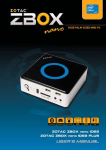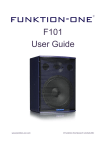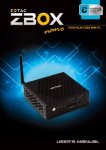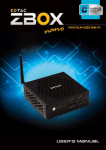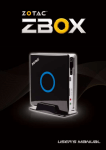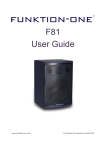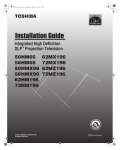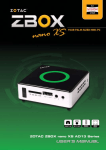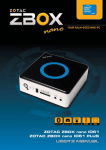Download Zotac ZBOX nano ID63
Transcript
ZOTAC ZBOX nano ZOTAC ZBOX nano User’s Manual No part of this manual, including the products and software described in it, may be reproduced, transmitted, transcribed, stored in a retrieval system, or translated into any language in any form or by any means, except documentation kept by the purchaser for backup purposes, without the express written permission of ZOTAC. Products and corporate names mentioned in this manual may not be registered trademarks or copyrights of their respective companies, and are used for identification purposes only. All trademarks are the property of their respective owners. Every effort has been made to ensure that the contents of this manual are correct and up to date. However, the manufacturer makes no guarantee regarding the accuracy of its contents, and reserves the right to make changes without prior notice. CAUTION: Risk of explosion if the battery is replaced with an incorrect type. Batteries should be recycled where possible. Disposal of used batteries must be in accordance with local environmental regulations. 1 ZOTAC ZBOX nano Table of Contents Product specifications--------------------------------------------------------------------------- 3 Safety information--------------------------------------------------------------------------------- 4 Setting up your system------------------------------------------------------------------------ 4 Care during use--------------------------------------------------------------------------------- 4 Welcome---------------------------------------------------------------------------------------------- 5 Package contents------------------------------------------------------------------------------- 5 Getting to know your ZOTAC ZBOX nano------------------------------------------------- 6 Front view----------------------------------------------------------------------------------------- 6 Rear view----------------------------------------------------------------------------------------- 7 BIOS settings of specific functions---------------------------------------------------------- 8 How to disable the ring LED indicator----------------------------------------------------- 8 How to enable USB 2.0 charge (for S3/S4/Sleep status)----------------------------- 9 How to disable integrated IR receiver (optional)---------------------------------------- 10 Customizing the ZOTAC ZBOX nano-------------------------------------------------------- 12 Installing a memory module------------------------------------------------------------------ 13 Installing a hard disk--------------------------------------------------------------------------- 14 Installing mSATA SSD Modules------------------------------------------------------------- 15 Connecting a S/PDIF cable------------------------------------------------------------------- 17 Setting up the ZOTAC ZBOX nano----------------------------------------------------------- 18 Positioning the ZOTAC ZBOX nano---------------------------------------------------------- 20 Mounting the ZOTAC ZBOX nano to a LCD monitor----------------------------------- 20 Installing drivers and software---------------------------------------------------------------- 22 Installing an operating system--------------------------------------------------------------- 22 Installing system drivers----------------------------------------------------------------------- 22 Using your ZOTAC ZBOX nano---------------------------------------------------------------- 23 Configuring wireless connection------------------------------------------------------------ 23 Configuring wired connection---------------------------------------------------------------- 23 Using a static IP----------------------------------------------------------------------------- 23 Using a dynamic IP (PPPoE connection)--------------------------------------------- 24 Configuring audio output via an HDMI device------------------------------------------- 24 ZOTAC nanoRAID User Manual-----------------------------------------------------------------------------25 Setting up the BIOS------------------------------------------------------------------------------------------25 Entering the RAID BIOS utility----------------------------------------------------------------------------26 Creating a RAID array---------------------------------------------------------------------------------------26 Deleting a RAID array---------------------------------------------------------------------------------------27 2 ZOTAC ZBOX nano Product specifications Chipset • Intel HM77 Product Dimensions • 127mm x 127mm x 45mm Onboard CPU • Intel Core processor Onboard graphics •Intel HD Graphics 4000 •HDMI & DP output Memory support • One 204-pin DDR3-1600/1333 SO-DIMM slot • Up to 8 GB of memory USB ports • Two USB 2.0 ports & four USB 3.0 ports Storage support • SATA 6.0 Gb/s transfer rates • Supports one 2.5-inch SATA HDD/SSD (9.5mm max height) or dual mSATA SSD via bundled nanoRAID adapter • One eSATA port Network support • Gigabit (10/100/1000Mbps) LAN • IEEE 802.3 compatible WiFi/BT support • 802.11b/g/n • High speed wireless connection up to 300 Mbps • Bluetooth v4.0 Audio • 2-channel high-definition audio • Jack-sensing compatible • Optical SPDIF Operating System support • Windows 7 & Windows 8 • 32-bit and 64-bit support IR receiver • Support carrier frequencies 36k Hz • Compatible with ZOTAC Media Remote 3 ZOTAC ZBOX nano Safety information Your ZOTAC ZBOX is designed and tested to meet the latest standards of safety for information technology equipment. However, to ensure your safety, it is important that you read the following safety instructions. Setting up your system Read and follow all instructions in the documentation before you operate your system. Do not use this product near water or a heat source such as a radiator. Set up the system on a stable surface with the provided stand. Never use the system alone without the stand. Openings on the chassis are for ventilation. Do not block or cover these openings. Make sure you leave plenty of space around the system for ventilation. Never insert objects of any kind into the ventilation openings. Use this product in environments with ambient temperatures between 0℃ and 35℃. , If you use an extension cord, please use the UL listed cord and make sure that the total ampere rating of the devices plugged into the extension cord does not exceed its ampere rating. Care during use Do not walk on the power cord or allow anything to rest on it. Do not spill water or any other liquids on your system. When the system is turned off, a small amount of electrical current still flows. Always unplug all power, modem, and network cables from the power outlets before cleaning the system. If you encounter the following technical problems with the product, unplug the power cord and contact a qualified service technician or your retailer. ¾¾ The power cord or plug is damaged. ¾¾ Liquid has been spilled into the system. ¾¾ The system does not function properly even if you follow the operating instructions. ¾¾ The system was dropped or the cabinet is damaged. ¾¾ The system performance changes. 4 ZOTAC ZBOX nano Welcome Congratulations on your purchase of the ZOTAC ZBOX nano mini-PC. The following illustration displays the package contents of your new ZOTAC ZBOX nano. Please contact your retailer If any of the below items are damaged or missed. Package contents • 1 x ZOTAC ZBOX nano mini-PC • 1 x ZOTAC VESA mount • 4 x Mount screws • 1 x AC Adapter • 1 x Power Cord • 1 x Headphone/SPDIF adapter • 1 x WiFi antenna • 1 x User Manual • 1 x Quick Start Guide • 1 x Support DVD 5 ZOTAC ZBOX nano Getting to know your ZOTAC ZBOX nano Front view 1 3 2 5 4 7 6 8 Refer to the diagram below to identify the components on this side of the system 1. Power switch The power switch turns the mini-PC ON and OFF. 2. HDD status indicator The hard disk LED blinks when data is being written onto or read from the hard disk drive 3. WiFi status indicator The WiFi LED blinks when data is being transfered over WiFi. 4. IR receiver The IR receiver is used to receive signals from the IR remote control (not included). Note: Please install CIR driver from DVD before using the integrated IR receiver. 5. Memory card slot The built-in memory card reader reads and writes MMC/SD/SDHC/MS/MS Pro/ xD/SDXC cards used in devices such as digital cameras, MP3 players, mobile phones and PDAs. 6. Headphone / mini-Optical S/PDIF jack The headphone / mini-Optical SPDIF jack (3.5mm) is used to connect the system’s audio output to amplified speakers or headphones. It supports miniOptical S/PDIF output with the included mini-Optical S/PDIF adapter. The optical S/PDIF output enables connectivity with digital audio receivers and speakers for crystal clear digital audio and surround sound from compatible soundtracks. 7. USB 2.0 ports The USB (Universal Serial Bus) ports are compatible with USB devices such as keyboards, mice, cameras and hard disk drives. 8. Microphone jack The microphone jack is designed to connect a microphone for video conferencing, voice narrations or simple audio recordings. Note 1: The power adapter may become warm to hot when in use. Do not cover the adapter and keep it away from your body. Note 2: Due to the unique tool-less customizable design, some connectors are placed upside down. 6 ZOTAC ZBOX nano Rear view 1 3 5 6 8 2 4 4 7 Refer to the diagram below to identify the components on this side of the system. 1. Power input (DC19V) The supplied power adapter converts AC power to DC power for use with this jack. Power supplied through this jack supplies power to the mini-PC. To prevent damage to the mini-PC, always use the supplied power adapter. 2. HDMI output The HDMI (High Definition Multimedia Interface) output supports Full HD 1080p displays such as an HDTV or monitor. 3. DisplayPort The DisplayPort output supports displays with resolutions up to 2560x1600. 4. USB 3.0 ports The USB 3.0 port supports the SuperSpeed USB 3.0 devices and is backwards compatible with USB 2.0/1.1 devices. Use this port for USB 3.0 devices for maximum performance with USB 3.0 compatible devices. 5. Ethernet port The eight-pin RJ-45 LAN port supports standard Ethernet cable for connection to a local area network (LAN) with speeds of 10/100/1000Mbps. 6. eSATA port The external SATA port is compatible with e.SATA devices such as external hard drives and Blu-ray drives. 7. WiFi antenna connector The WiFi antenna connector supports the included WiFi antenna. 8. Ventilation area The ventilation area is vital for proper system cooling. Do not cover. 7 ZOTAC ZBOX nano BIOS settings of specific functions The ZOTAC ZBOX nano has specific functions that can be enabled or disabled in the BIOS settings such as LED indicator, USB 2.0 charging and integrated IR receiver. How to disable the ring LED indicator 1. Turn on the ZBOX nano mini-PC, then press <Delete> to enter the BIOS SETUP UTILITY. 2. Use the arrow keys to navigate to the PowerManage menu and select Back Light. 8 ZOTAC ZBOX nano 3. Press <Enter> and select Disabled. 4. Press F10 to save the configuration and exit. The PC will reboot. How to enable USB 2.0 charge (for S3/S4/Sleep status) 1. In PowerManage menu, select USB 2.0 S3/S4/S5 Charge Function and press <Enter>. 2. Use the arrow keys to enter the item Front(Left/Right) USB2.0 S3/S4/S5 Charge, and select Enabled. 9 ZOTAC ZBOX nano 3. Press F10 to save the configuration and exit. Note: Before charging via USB 2.0 in S5 status, please make sure the Deep S5 (Deep Sleep in PowerManage menu) is disabled. How to disable integrated IR receiver (optional) 1. Use the arrow keys to navigate to the Advanced menu and select CIR Controller. 10 ZOTAC ZBOX nano 2.Enter CIR Controller and select Disabled. Enabled: enable the internal IR receiver (default) Disabled: disable the internal IR receiver 3. Press F10 to save the configuration and exit. 11 ZOTAC ZBOX nano Customizing the ZOTAC ZBOX nano Before installing hardware, please follow the instructions below to remove the cover of your ZOTAC ZBOX. 1. Remove the four screws securing the bottom cover into place. 2. Locate side with engraving that says “Pull Upward.” Pull upward on the cover as shown below 12 ZOTAC ZBOX nano Installing a memory module 1. Locate the SO-DIMM memory slot and insert a SO-DIMM memory module into the slot at a 45 degree angle. 2. Gently press down on the memory module until it locks into place by the arms of the memory slot. 13 ZOTAC ZBOX nano Installing a hard disk 1. Locate the hard disk bracket, remove the 2 screws, and remove the hard disk bracket as shown in the image below. 2. Install the hard disk bracket onto a 2.5-inch SATA hard disk with 2 screws. 3. Insert the hard disk into the socket and gently slide into the connector. 14 ZOTAC ZBOX nano 4. Reinstall the screws for the hard disk bracket. Installing mSATA SSD Modules 1. Install the HDD bracket on the nanoRAID adapter with two screws. 15 ZOTAC ZBOX nano 2. Insert an mSATA SSD into the slot at a 45 degree angle. 3. Gently press down on the mSATA SSD with one finger and ensure that the mSATA SSD is installed completely. 4. Insert the mSATA SSD bracket into the HDD slot at a 45 degree angle. 16 ZOTAC ZBOX nano Connecting a S/PDIF cable 1. Connect the S/PDIF cable to the mini-Optical S/PDIF adapter. 2. Locate the front panel and connect the mini-Optical S/PDIF adapter to the headphone / mini-Optical S/PDIF jack. 17 ZOTAC ZBOX nano Setting up the ZOTAC ZBOX nano Please connect your peripherals before using your ZOTAC ZBOX 1 2 3 1. Connecting a DisplayPort display Connect the DisplayPort connector to the DP port. 2. Connecting USB 3.0 device Connect USB 3.0 devices such as external hard drives, SSDs and flash drives to the USB 3.0 port. 3. Connecting the WiFi antenna module Connect the WiFi antenna module to the WiFi antenna connector. 18 ZOTAC ZBOX nano 4 5 6 7 4. Turning on the system Connect the supplied AC adapter to the DC IN jack on the system rear panel and then press the power switch on the front panel to turn on the system. 5. Connecting to an HDMI display Connect one end of an HDMI cable to the HDMI port on the system rear panel and the other end to a HDMI-compatible display such as an HDTV or monitor. (When both the HDMI and the DP are connected, the audio output is from HDMI by default.) 6. Connecting to a network device Connect one end of a network cable to the LAN port on the system rear panel and the other end to a network hub, switch or router. 7. Connecting an eSATA device Connect the eSATA cable to the eSATA port. Note: When your ZOTAC ZBOX nano is not in use, unplug the power adapter or switch off the AC outlet to conserve power. 19 ZOTAC ZBOX nano Positioning the ZOTAC ZBOX nano • Do not position the ZOTAC ZBOX where the ventilation holes are covered. To guarantee proper use, leave 4 inches (10 cm) of spacing in front of the ventilation holes. • ZOTAC ZBOX nano mini-PC systems provide ample connectivity in a tiny form factor, please choose connectors and cables in appropriate sizes to avoid interference. Mounting the ZOTAC ZBOX nano to a LCD monitor You can attach your ZOTAC ZBOX to the back of a VESA75/100 compliant monitor. 1. Secure the VESA mount to the LCD monitor using 4 screws (not included). Disclaimer: ZOTAC cannot be held liable for damages resulting from an improper installation. 2. Align the ZOTAC ZBOX mounting holes to the VESA mount attachment pegs. Attach the ZOTAC ZBOX to the VESA mount and gently press down to secure the ZBOX to the mount. 20 ZOTAC ZBOX nano 3. Connect the ZOTAC ZBOX nano to your LCD monitor with an HDMI/DP cable. 21 ZOTAC ZBOX nano Installing drivers and software Installing an operating system The ZOTAC ZBOX does not ship with an operating system preinstalled. The user must install the operating system before the ZOTAC ZBOX can be used. The following operating systems are supported: • Windows 7 • Windows 8 Follow the instructions below to install an operating system: 1. Attach external DVD drive via USB. 2. Insert disk for operating system 3. Wait for the ZOTAC ZBOX nano to boot from the disk. 4. Follow the onscreen directions to install the operating system. 5. Install system drivers to gain full functionality of the ZOTAC ZBOX hardware and features. Note: For best compatibility, please only use the eSATA or USB 2.0 ports as the OS installation source drive connection. Installing system drivers Before you can use the full features of the ZOTAC ZBOX nano, the system drivers must be installed. The following types of operating systems are supported by the ZOTAC ZBOX nano driver DVD: • Windows 7 • Windows 8 Follow the instructions below to install the system drivers: 1. Insert the ZOTAC ZBOX nano driver DVD. If autorun is enabled, the driver installation main menu will show up automatically. Note: If autorun is disabled, you can click the file Launch.EXE to bring up the driver installation main 2. 22 menu. The following drivers are available on the DVD: • Intel Chipset Driver • HDA Sound Driver • Intel Graphics Driver • Ethernet PCI-E Driver • USB 3.0 Controller Driver • Wireless Network Driver • Intel Management Engine • CIR Driver • Bluetooth Driver • MassStorage Driver • USB Charger (optional) ZOTAC ZBOX nano Note: If you want to use USB charger for iPhone/iPad, please install the driver at X:\Utility\Software\Usb Charger\setup.exe (X: your driver disk letter). Click the icon to review the Page 2 of the driver DVD: • E-SATA Controller Each driver must be installed individually to ensure proper operation of the ZOTAC ZBOX nano. 3. Select the driver you want to install. The driver installer should launch. 4. Follow the onscreen instructions for the selected driver to install. 5. Restart the system. Using your ZOTAC ZBOX nano Configuring wireless connection Please follow the instructions below to connect to a wireless network: 1. Double-click the wireless network icon (pic) in the notification area. 2. Select the wireless network you want to connect to from the list and click Connect. 3. After connection is established, you will see “Connected.” Note 1: For security concerns, Do NOT connect to an unsecured network, otherwise, the transmitted information without encryption might be visible to others. Note 2: Enter the network security key if necessary. Configuring wired connection Using a static IP 1. Right-click the network icon in the notification area and select “Open Network Connections”. 2. Right-click “Local Area Connection” and select “Properties”. 3. Highlight “Internet Protocol (TCP/IP)” and click “Properties”. 4. Select “Use the following IP address”. 5. Enter your IP address, subnet mask and Default gateway. 6. Enter the preferred DNS server address if necessary. 7. After entering all of the related values, click “OK” to finish the configuration. 23 ZOTAC ZBOX nano Using a dynamic IP (PPPoE connection) 1. 2. 3. 4. 5. 6. Repeat Step 1-3 in the previous section. Select “Obtain an IP address automatically” and click “OK”. Click “Create a new connection” to start the NEW Connection Wizard. Click “Next”. Select “Connect to the Internet” and click “Next”. Select “Set up my connection manually”. 7. Select your connection type and click “Next”. 8. Enter your ISP Name and click “Next”. 9. Enter your User name and Password. Click “Next”. 10. Click “Finish” to finish the configuration. 11. Enter your user name and password. Click “Connect” to connect to the internet. Note: Contact your internet Service Provider (ISP) if you have problems connecting to the network. Configuring audio output via an HDMI device Follow the steps below to enable audio output via HDMI when connecting the ZOTAC ZBOX nano to a TV or receiver via HDMI. 1. Access the Sound settings via the system Control Panel. 2. Under Playback devices, click the display device that corresponds with your HDMI audio compatible display 3. Click the “Set Default” button in the lower right hand corner. 4. Click “OK” to exit the setup. 24 ZOTAC ZBOX nano ZOTAC nanoRAID User Manual Setting up the BIOS 1. 2. 3. Setting your computer, then press <Delete> to enter BIOS SETUP UTILITY. Use the arrow key to select Advanced menu. When enter the Advanced menu, select the Item “Storage Configuration”. Enter Storage Configuration > SATA Mode Selection, and select “RAID.” 4. Enable the disks that you want to use as RAID disks. 5. Press F10 to save the configuration and exit. The PC reboots. Note: The RAID is only available when two mSATA SSD modules are installed in the ZOTAC nanoRAID adapter. 25 ZOTAC ZBOX nano Entering the RAID BIOS utility 1. During POST, press <Ctrl-I> to enter the Intel(R) Rapid Storage Technology RAID BIOS menu. 2. The main Intel(R) Rapid Storage Technology RAID BIOS menu appears. 3. Use the arrow keys to move the color bar and navigate through the items. Creating a RAID array 1. In the main Intel(R) Rapid Storage Technology RAID BIOS menu, highlight Create RAID Volume using the #$ arrow key then press <Enter>. 2. When the item RAID Level is highlighted, use the level that you want to create. 26 # $ arrow key to select the RAID ZOTAC ZBOX nano Note: The Select Disks item is only selectable when two drives are installed in the ZBOX. Users can select the drives to include in the RAID array in this sub-menu. Please note that selected disks will be formated and lose all data. 3. Press <Enter> to confirm the creation of the RAID array. A dialogue box appears to confirm the action. Press <Y> to confirm; otherwise, press <N>. 4. The following screen appears, displaying the relevant information about the RAID array you created. Deleting a RAID array 1. In the main Intel(R) Rapid Storage Technology RAID BIOS menu, highlight Delete RAID Volume using the #$ arrow key then press <Enter>. 2. Use the space bar to select the RAID set you want to delete. Press the <Del> key to delete the array. 27 ZOTAC ZBOX nano 28 291-MB212-00
































